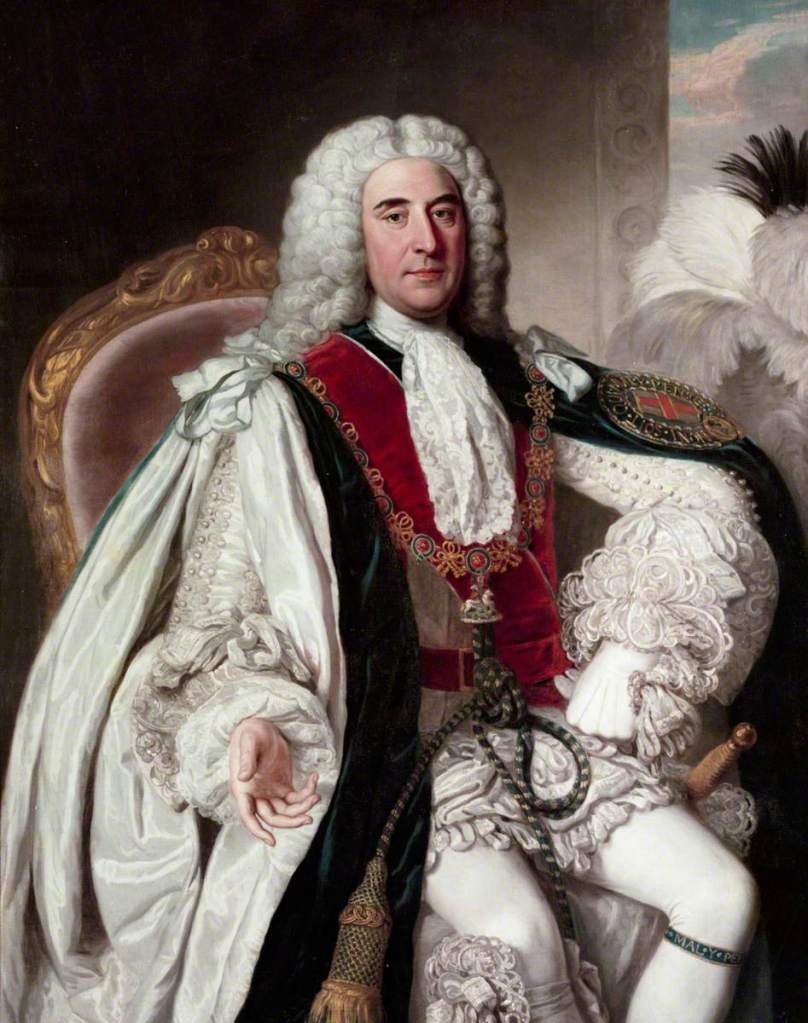In the latest blog for the Georgian Lords, Dr Stuart Handley considers how the outgoing premier, the duke of Newcastle, was able to ensure his supporters were rewarded in an early example of ‘resignation honours’.
Upon leaving office Prime Ministers have long sought to reward their most important advisers in what has become known as a “resignation honours list”. The first to do so formally was Lord Rosebery in 1895, but eighteenth-century Prime Ministers were no different. After serving in government for decades Thomas Pelham-Holles, duke of Newcastle, had a number of obligations towards his closest advisers and family members, as he sought to provide for their future well-being.

When Newcastle resigned on 11 Nov. 1756, to facilitate the formation of the administration of the 4th duke of Devonshire and William Pitt, rumours surfaced in the press that he had retired with a pension of £6,000 per annum. To counteract these, Newcastle had several notices inserted in newspapers denying that he had asked or received any grant of place or pension for himself. In this Newcastle was being politically astute for he wished to avoid obligations for the future; as he had written to his friend the earl of Hardwicke on 2 November, ‘I would ask nothing that would not leave us free hereafter.’ [BL, Add. 32836, f. 540]
If Newcastle chose not to take anything for himself, he was eager to assist some of his followers. Henry Fox, who had just resigned as secretary of state, noted on 13 November that Newcastle had ‘got his dukedom entailed on Lord Lincoln, and four reversions of great value granted to Shelley, Pelham, Jones and West and has made Sir G. Lyttelton a peer.’ [Campbell, Correspondence,221-2]. By the end of the month, Horace Walpole was able to scoff at Newcastle’s selflessness:
here is a list of his disinterestedness. The reversion of his dukedom for Lord Lincoln: this is the only duchy bestowed by the present King: … Mr. Shelley, the Duke’s nephew, has the reversion of Arundel’s place. Mr. West has a great reversion for himself and his son: your little waxen friend, Tommy Pelham, has another reversion in the Customs. Jones, the Duke’s favourite secretary, and nephew of the late Chancellor, has another. Not to mention the English barony for Sir George Lyttelton, and the Irish earldom for Mr. O’Brien
Walpole Correspondence, xxi. 26
Let us examine this veritable catalogue of honours in more detail.
Most important for Newcastle was the grant of a new dukedom of Newcastle under Lyne. Without heirs, Newcastle’s existing dukedom of Newcastle upon Tyne would die with him. This new grant was entailed upon his nephew and heir the earl of Lincoln (son of his sister Katherine, who had married the eldest daughter of his brother Henry Pelham). The origin of the title seems to have come from Lincoln, who suggested it in case there was a problem with re-using Newcastle-upon-Tyne.
Another nephew, John Shelley, son of Newcastle’s sister, Margaret Pelham, who had married Sir John Shelley, 4th bt, was given the reversion to the clerkship of the pipe, to which he succeeded in 1758. Shelley had been brought into the Commons for East Retford in 1751 and had designs on marrying his cousin, Mary, daughter of Henry Pelham. In spite of being picked out by Newcastle, he did not remain loyal when the duke found himself in opposition, becoming a devotee of William Pitt and even acquiring the nickname ‘the little commoner’ because of the way he ‘aped’ Pitt (known as the ‘Great Commoner).
Newcastle’s secretary, James West, Member for St. Albans, who had been a long-time servant of both Newcastle and Henry Pelham, received the reversion of the auditorship of the land revenues for himself and his son. The son inherited the post in 1775, retaining it until his death in 1795.
Newcastle’s cousin, from the Stanmer branch of the family, Thomas Pelham, Member for Sussex (already a commissioner of trade) was given the reversion of the surveyor-generalship of the customs of London, which fell to him in 1773, and which he retained until his death in 1808. Upon Newcastle’s death in 1768 he inherited the Pelhams’ estates in Sussex and the Pelham barony. He was created earl of Chichester in 1805.
Another secretary, Hugh Valence Jones, MP for Dover, served faithfully as Newcastle’s amanuensis, got a reversion to the comptrollership of the customs, which he held from 1780-1800. His mother was the sister of Newcastle’s greatest ally, the long serving Lord Chancellor, Hardwicke.
Sir George Lyttelton, 5th bt, MP for Okehampton, one of the original ‘Cobham’s Cubs’ had not followed Pitt into opposition and had served as Newcastle’s Chancellor of the Exchequer in 1755-6. According to Horace Walpole, his ‘warmest prayer was to go to heaven in a coronet’, and he was created Baron Lyttelton of Frankly on 18 November 1756.
Percy Wyndham O’Brien, MP for Cockermouth, was also a treasury lord under Newcastle in 1755-6. He received an Irish peerage as earl of Thomond in December 1756, but this may have owed more to the initiative of the duke of Devonshire, who offered him the peerage, than to Newcastle. He continued to sit in the Commons until his death in 1774.
Newcastle had lived up to his reputation for administrative effectiveness. All his recipients (or their families) were thus well rewarded in his “resignation honours list”.
SNH
Further reading:
R. Browning, The Duke of Newcastle (1975)
Correspondence of John Campbell MP, with his family, Henry Fox, Sir Robert Walpole and the Duke of Newcastle, 1734-1771, ed. J.E. Davies, Parliamentary History Texts and Studies, 8 (2013).
J.C.D. Clark, The Dynamics of Change: the crisis of the 1750s and the English party system (1982)
L. Namier and J. Brooke, History of Parliament: the Commons 1754-1790
